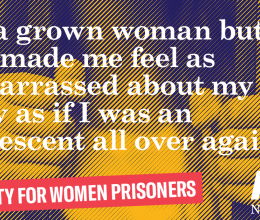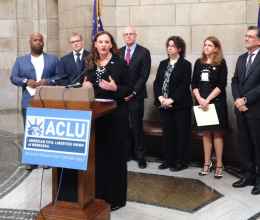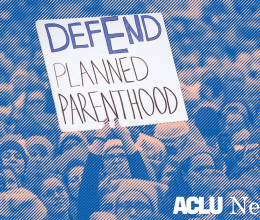For more than five years, the female jail population has been the fastest growing correctional population in the United States. In Nebraska, the number of women in jail or prison is also on the rise. Yet jails and prisons often fail to address the unique needs of women in these facilities.
Recently, at the national level, legislative momentum from a bill introduced by four senators led the Bureau of Prisons to issue a memorandum requiring federal facilities to provide a range of sanitary products including tampons, panty liners, and maxi pads at no cost to prisoners.
Women in Nebraska also need access to sanitary products without being charged dramatically more than the prices at a grocery store. In Nebraska facilities, there is only one free pad option available to female prisoners. The quality of the free pads, as well as the frequency and manner of distribution of these supplies, is not clear. None of Nebraska’s facilities have a free tampon option.
“I was humiliated. I’m a grown woman but this made me feel as embarrassed about my body as if I was an adolescent all over again.”
A woman from greater Nebraska told the ACLU this year, “I was arrested and couldn’t post bond. During my first week there, I was actually having my period but the guards didn’t seem to have any idea how to handle that. I begged for a new pad—I didn’t have any cash to buy one. They kept me waiting two days before finally giving me one. I was humiliated. I’m a grown woman but this made me feel as embarrassed about my body as if I was an adolescent all over again.”
Nebraska facilities differ in the cost and variety of feminine hygiene products available for purchase at the commissaries. Lancaster and Douglas County jails both offer only one tampon option for purchase at a cost of more than thirty-five cents per tampon. By contrast, outside of a prison or jail, tampons can be purchased for less than ten cents per tampon.
The Nebraska Correctional Center for Women (NCCW), located in York, charges $2.17 for a box of ten tampons. Female prisoners who are employed at NCWW make between $1.21 and $4.72 a day, or an average of $154.18 per year. Assuming that a woman has a five-day menstrual period each month and changes her tampon at 8 hour intervals, the maximum time suggested by gynecologists, a woman using tampons at NCCW is spending $39.06, or 25% of her annual salary on feminine hygiene products.
The Youth Rehabilitation and Treatment Center (YRTC) in Geneva houses girls ages 14 to 19. Like adult women in Nebraska facilities, girls at Geneva must pay for their feminine hygiene products. Young women cannot earn money while in the YRTC so their families are likely paying for these products. Families, many of whom are poor, are already shouldering the costs of travel, sometimes across the state, to visit with their family member placed at the YRTC.
Many women in Nebraska facilities, who are disproportionately poor and Black, Latina and Native American, simply cannot afford to purchase any feminine hygiene products. These women may be forced to either bleed through their clothing or wear one tampon or pad for multiple days. This is dangerous and potentially deadly for Nebraska women. Jails and prisons are increasing a woman’s chances for bacterial or fungal infections or the rare, but sometimes deadly, toxic shock syndrome associated with leaving tampons in for longer than recommended. Working together we can change this.
Feminine hygiene products including pads, panty liners, and tampons, in varying types, must be seen as basic human necessities, not luxury items available for purchase. Female prisoners deserve to be treated with dignity. Women in Nebraska’s prisons should not be shamed and humiliated for their biology. Nebraska must adopt a policy in which women in prison have access to free sanitary products, in varying types. This is about gender equity, reproductive justice, and prisoner's rights to basic dignity and respect.
Note: Some transgender men also use tampons and pads. We encourage any individual being denied access to tampons and pads in a Nebraska facility to contact our office.




